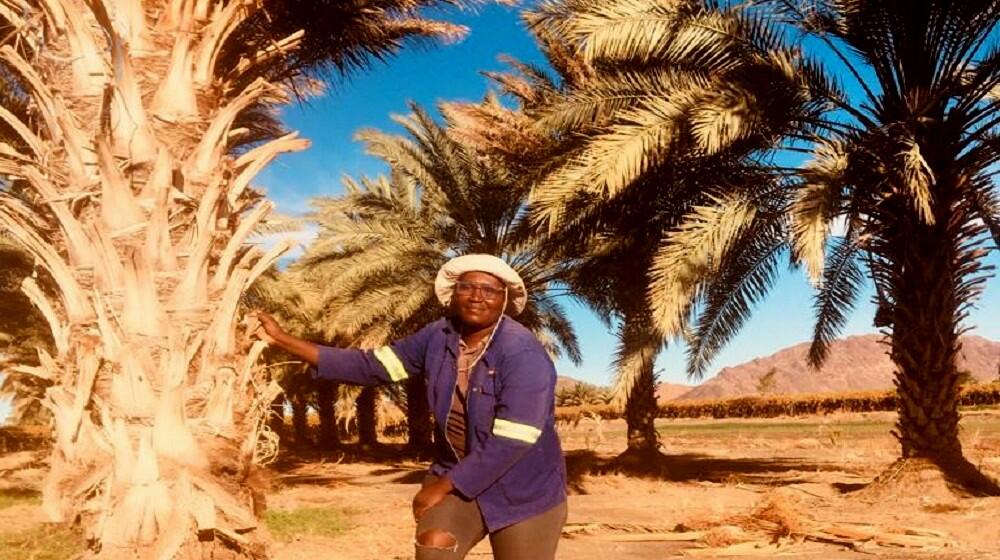
LÜDERITZ – Namibia, Alicia Nghikwena, 34, is proud of her 34 date palm trees. They are her key source of income. With the profit she makes from the sales of dates, she is able to take care of her three children, the youngest twins, as well as support her siblings and other extended family members.
Alicia, who hails from the northern part of Namibia, Oshandi village in Ohangwena Region, was raised by her aunt from the tender age of 11 when her mother passed away in 1999. Upon completing Grade 10, Alicia moved to Khorixas in 2009 with the hopes of continuing her education to complete Grade 12. However, due to a lack of funds, she was not able to complete her Grade 12 and found herself working as a receptionist at a campsite. After working at the campsite for five years, she moved to Mariental where she worked at a lodge as a massage therapist.
In 2015, her contract ended and she decided to move to Windhoek to look for a job. She saw an advert in the newspaper from the Ministry of Agriculture, Water and Land Reform calling for small-scale farmers, Alicia applied, a decision she does not regret. Alicia’s application was successful, and she was admitted for a course in horticulture and gardening. She was also given a four-hectare plot from the Ministry of Agriculture, Water and Land Reform to start farming.
The training has helped me a lot. I’ve learned about all the steps that go into fruits and vegetable production - from soil preparation to smart fertilisation, from pests and disease prevention to daily plant cultivation.
“The training has helped me a lot. I’ve learned about all the steps that go into fruits and vegetable production - from soil preparation to smart fertilisation, from pests and disease prevention to daily plant cultivation. Everything I needed to know to become an effective small-scale farmer,” she said.
Alicia used the land she had received from the Ministry to plant date palms on two hectares, grapes on 1.6 hectares and vegetables on the remaining hectares of land.
Alicia is one of the youth agripreneurs who showcased their produce during the National Youth Week held in Lüderitz from 26 to 29 April 2022, under the theme, “Promotion of Youth Agripreneurship: An Avenue for Self-Employment and Work Readiness.”
Self-reliant
Alicia says that her date crop which she harvests once a year generates a net annual income of approximately N$200 000 and is her main income. At nearly N$50 000 per annum her grape crop, harvested once a year, is her second source of income. Vegetables (tomatoes and green peppers) come third, adding some N$20 000 to her income.
“We deliver the dates to markets in the Maldives and Saudi Arabia and sell them to other exporters who know about our produce through referrals. We also sell directly to small-scale consumers locally,” says Alicia.
She advises other youth:“We need to meet the Government halfway and try to do something for ourselves.”
Building back better
Hon. Agnes Tjongarero, Minister of Sport, Youth and National Service who officially opened the National Youth Week celebrations in Lüderitz encouraged youth to undertake the rewarding path of agripreneurship. In her words “seeing things through young people’s eyes the multimillion-dollar question remains how do we build back better? How do we ensure that the Namibian House remains for each one of us and that every young person has a fair chance at prosperity and economic inclusion?”
The Minister expressed her appreciation to the National Youth Council (NYC) for heeding this call once more, and for championing a skills-based, knowledge-based economy that prioritises agripreneurship and agrobusiness.
“We recognise that young people are on the frontlines of the struggle to build a better future for all,” she stated.
The Minister’s sentiments were reiterated by Sheila Roseau, United Nations Population Fund (UNFPA) Namibia Representative in her remarks on behalf of the UN System in Namibia: “Youth agribusiness development has been identified as a primary stimulus for growing Namibia’s agricultural sector through high and inclusive growth and contributing to food security and poverty alleviation as well as employment creation, particularly for youth in rural areas.”
“The UN’s emphasis is on youth empowerment, to enable and to create substantial value along Namibia’s agricultural value chains. Given this focus to broaden development goals through agricultural trade, farm services, agro processing, rural and urban retailing as well as food services,” she added.
UNFPA response
UNFPA interventions in Namibia are aimed at improving the quality of life of young people. UNFPA continues to collaborate with the Ministry of Sport, Youth and National Service and other various youth-serving and youth-led organisations to empower young people. The UNFPA Namibia Country Office through different programmes such as the Safeguard Young People (SYP) continues to empower young people to access sexual and reproductive health (SRH). UNFPA is working with non-traditional partners such as agricultural to ensure economic empowerment for young people in order to have every young person’s potential fulfilled.


